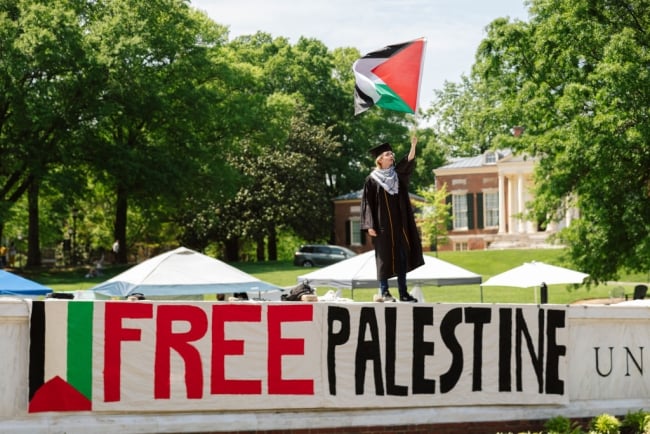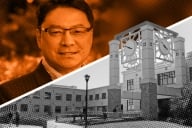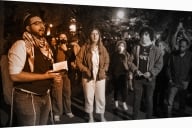You have /5 articles left.
Sign up for a free account or log in.

A graduating student at Johns Hopkins University stands in the campus’s pro-Palestine encampment.
Wesley Lapointe/The Washington Post via Getty Images
The 2024 graduation season is well underway, even as protesters continue to occupy lawns on campuses across the nation. But students aren’t the only ones pushing their institutions to divest from companies that support Israel’s war in Gaza; now, commencement speakers are getting in on the activism too.
In her May 2 address to graduating students at the University of Michigan’s School of Public Health, Jodi-Ann Burey, a cancer survivor, speaker, writer, and host of the podcast Black Cancer, used her speech to criticize administrators for refusing to divest from Israel.
“Leaders at this university have decided that divestment in solidarity with Ukraine is more moral and more urgent than divestment in solidarity with the Palestinian people of Gaza,” said Burey, who received her master’s in public health from Michigan.
The statement was followed by more than 15 seconds of cheers and applause.
“We are witnessing the most well-documented genocide in human history on our cellphones,” she continued. “Every issue you came to [the School of Public Health] to dedicate your career towards—maternal health, infection disease prevention, noncommunicable illness, mental health, food security, health care systems, humanitarian aid—is at a point of crisis in Gaza.”
She called on the students to remember that public health outcomes are intertwined with politics, and often unfairly connected to an individual’s status or birthplace.
Mohammed Abdi, who is graduating with his master of public health degree and is also president of the Muslim Students in Public Health student organization, wrote in an email to Inside Higher Ed that he was heartened by Burey’s words.
“Her comments were a necessary response to the ongoing genocide in Gaza, particularly at a graduation in a School of Public Health,” he wrote. “Hundreds of students graduating from our School are commencing their careers as public health professionals; a reminder that the primary drive in our careers should be to protect all human lives is timely and very appropriate.”
In an email to Inside Higher Ed, a university spokesperson disputed the idea that the institution had made any divestments related to Russia’s war in Ukraine.
“The action related to Ukraine in 2022 was not a divestment. It was taken as a result of U.S. government sanctions on Russia. Most Western institutional investors, including the university, moved swiftly at the time to reduce their exposure to Russia and Russia-domiciled investments to comply with the law and to mitigate the impact on their portfolios,” wrote Colleen Mastony, assistant vice president for public affairs.
Erin A. Hennessy, executive vice president of TVP Communications, said it is well within graduation speakers’ rights to criticize the university that invited them, as long as they do it civilly and respectfully—even though institutions would probably prefer they restrict such comments to their own platforms instead.
“I would not be surprised if people felt empowered and supported to raise some important questions” during speeches this graduation season, she said.
Abdi argued that the School of Public Health’s graduation was, in fact, an ideal venue for Burey to speak out about the crisis in Gaza.
“As a world-renowned school of public health with an explicit commitment to reducing disease and improving health, both locally and globally, mentioning the ongoing genocide in Gaza is consistent with our professional duties … [Burey’s] speech was a skillful call-in to public health professionals to do more, and to remind us that we are all here for each other,” he wrote.
Elsewhere, speakers have pulled out of commencement gigs to protest universities’ treatment of pro-Palestinian student demonstrators. Two writers slated to speak to master’s and doctoral graduates at the University of Southern California’s Rossier School of Education canceled over the weekend. In an open letter to the university’s provost, president and board of trustees, C Pam Zhang, author of the novel How Much of These Hills Is Gold, and Safiya U. Noble, a University of California, Los Angeles, professor and the author of Algorithms of Oppression: How Search Engines Reinforce Racism, cited the administrators’ decision to deploy police officers to arrest pro-Palestinian protesters. They also mention the prior cancellation of valedictorian Asna Tabassum’s commencement address.
“To speak at USC in this moment would betray not only our own values, but USC’s too. We are withdrawing as commencement speakers,” they wrote.
Zhang and Noble said they hoped the letter would help pressure USC administrators to meet with student protesters, offering to give the commencement address as scheduled if they did so.
“Until such time, we call on all commencement speakers still scheduled to appear at satellite ceremonies to join us by signing this letter; withdrawing from USC events; and supporting USC students, as well as thousands of students nationwide who deserve respect, not arrest and punishment by their own universities, for courageously speaking truth to power,” they wrote.
USC announced last week that its main stage commencement ceremony and invited outside speakers would be cancelled this year, citing safety concerns.
Planned speakers for the City University of New York Law School graduation recently pulled out as well; they said they were uncomfortable speaking at the ceremony after the university decided last fall to cut student speeches from the program altogether, allegedly because speakers in previous years had made comments supporting Palestinians and critical of Israel, according to The Forward.
“I cannot, as a leader of the nation’s oldest guardian of free expression, participate in an event in which students believe that their voices are being excluded,” one of the planned speakers, American Civil Liberties Union president Deborah Archer, reportedly wrote in an email to university leaders.
Withdrawing on Principle
Hennessy criticized individuals who pull out of commencement celebrations for putting institutions in the difficult position of having to select a new speaker and explain the change to graduates and families. Even so, she noted, most students don’t care enough about their graduation speaker for the change to make a huge impact.
“For a lot of students, they don’t know who this person is and they don’t really care who this person is unless you get the Oprahs, the Beyonces, the Bill Gates-es,” she said.
But Angus Johnston, a history professor at Hostos Community College who studies student activism, noted that speakers who pull out of graduation ceremonies are likely giving up payment and changing travel plans to support causes they believe in.
“If someone has been honored by a college, has accepted that honor and has made plans to show up, they are not going to withdraw capriciously,” he said. “They are giving something up in their decision to withdraw and I think it is reasonable to take them at their word when they describe the reasons for which they made that decision.”
Most likely, Johnston said, the number of speakers who withdraw or who critique the institution they are addressing will be vastly outnumbered by those who are boycotted or jeered at by students. Already, students at the University of Vermont have criticized their institution’s decision to invite Linda Thomas-Greenfield, the U.S. ambassador to the United Nations, to address graduates and receive an honorary degree, because she has thrice vetoed a ceasefire in Gaza.
“UVM has made the abhorrent decision to award war criminal Linda Thomas-Greenfield an honorary degree and allow her to deliver the Class of 2024 commencement speech,” the institution’s Students for Justice in Palestine chapter wrote on Instagram. “As Linda Thomas-Greenfield’s complicity is directly responsible for the deaths of our friends and families, as three Palestinian students were shot two blocks from where Linda is scheduled to speak, her presence on campus would be indescribable [sic] damaging to our campus community and must be resisted with utmost urgency.”
UVM provost and senior vice president Patricia Prelock has since agreed to bring student concerns about Thomas-Greenfield to other administrators as part of ongoing negotiations with protesters who have staged an encampment on campus, VT Digger reported.
At Morehouse College, students and faculty have staunchly objected to the administration’s decision to invite President Biden to speak at graduation, citing his ongoing support of Israel in its war on Gaza.
None of it surprises Johnston.
“Protests at commencement addresses are frankly more the norm than the exception in American history over the past century or so,” he said.
Still, while such protestations may be par for the course, he added, this political moment is decidedly not.








